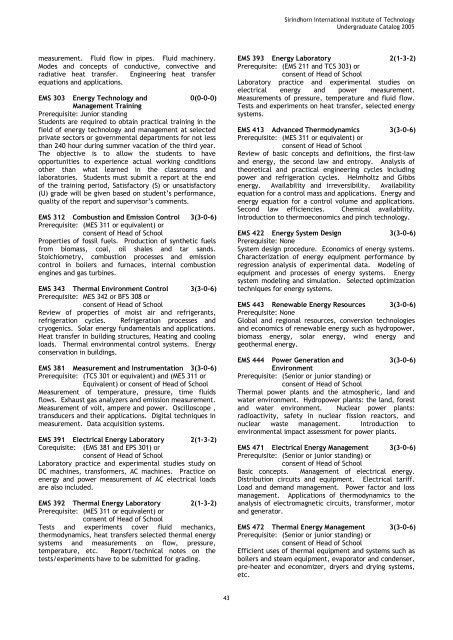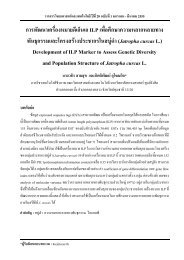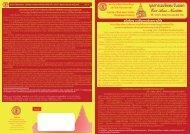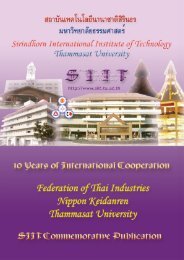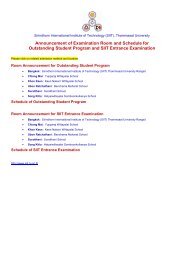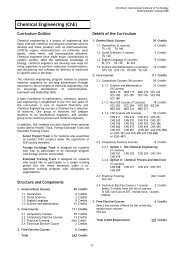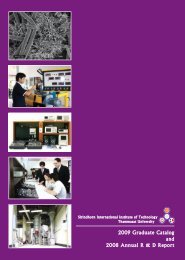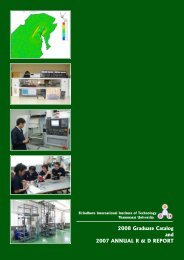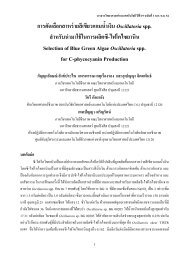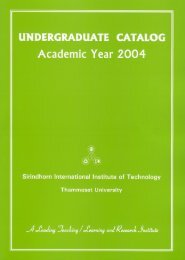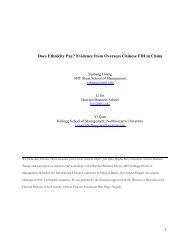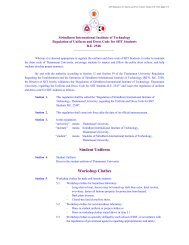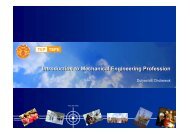Course Description - Sirindhorn International Institute of Technology
Course Description - Sirindhorn International Institute of Technology
Course Description - Sirindhorn International Institute of Technology
You also want an ePaper? Increase the reach of your titles
YUMPU automatically turns print PDFs into web optimized ePapers that Google loves.
<strong>Sirindhorn</strong> <strong>International</strong> <strong>Institute</strong> <strong>of</strong> <strong>Technology</strong><br />
Undergraduate Catalog 2005<br />
measurement. Fluid flow in pipes. Fluid machinery.<br />
Modes and concepts <strong>of</strong> conductive, convective and<br />
radiative heat transfer. Engineering heat transfer<br />
equations and applications.<br />
EMS 303 Energy <strong>Technology</strong> and 0(0‐0‐0)<br />
Management Training<br />
Prerequisite: Junior standing<br />
Students are required to obtain practical training in the<br />
field <strong>of</strong> energy technology and management at selected<br />
private sectors or governmental departments for not less<br />
than 240 hour during summer vacation <strong>of</strong> the third year.<br />
The objective is to allow the students to have<br />
opportunities to experience actual working conditions<br />
other than what learned in the classrooms and<br />
laboratories. Students must submit a report at the end<br />
<strong>of</strong> the training period, Satisfactory (S) or unsatisfactory<br />
(U) grade will be given based on student’s performance,<br />
quality <strong>of</strong> the report and supervisor’s comments.<br />
EMS 312 Combustion and Emission Control 3(3‐0‐6)<br />
Prerequisite: (MES 311 or equivalent) or<br />
consent <strong>of</strong> Head <strong>of</strong> School<br />
Properties <strong>of</strong> fossil fuels. Production <strong>of</strong> synthetic fuels<br />
from biomass, coal, oil shales and tar sands.<br />
Stoichiometry, combustion processes and emission<br />
control in boilers and furnaces, internal combustion<br />
engines and gas turbines.<br />
EMS 343 Thermal Environment Control 3(3‐0‐6)<br />
Prerequisite: MES 342 or BFS 308 or<br />
consent <strong>of</strong> Head <strong>of</strong> School<br />
Review <strong>of</strong> properties <strong>of</strong> moist air and refrigerants,<br />
refrigeration cycles. Refrigeration processes and<br />
cryogenics. Solar energy fundamentals and applications.<br />
Heat transfer in building structures, Heating and cooling<br />
loads. Thermal environmental control systems. Energy<br />
conservation in buildings.<br />
EMS 381 Measurement and Instrumentation 3(3‐0‐6)<br />
Prerequisite: (TCS 301 or equivalent) and (MES 311 or<br />
Equivalent) or consent <strong>of</strong> Head <strong>of</strong> School<br />
Measurement <strong>of</strong> temperature, pressure, time fluids<br />
flows. Exhaust gas analyzers and emission measurement.<br />
Measurement <strong>of</strong> volt, ampere and power. Oscilloscope ,<br />
transducers and their applications. Digital techniques in<br />
measurement. Data acquisition systems.<br />
EMS 391 Electrical Energy Laboratory 2(1‐3‐2)<br />
Corequisite: (EMS 381 and EPS 301) or<br />
consent <strong>of</strong> Head <strong>of</strong> School<br />
Laboratory practice and experimental studies study on<br />
DC machines, transformers, AC machines. Practice on<br />
energy and power measurement <strong>of</strong> AC electrical loads<br />
are also included.<br />
EMS 392 Thermal Energy Laboratory 2(1‐3‐2)<br />
Prerequisite: (MES 311 or equivalent) or<br />
consent <strong>of</strong> Head <strong>of</strong> School<br />
Tests and experiments cover fluid mechanics,<br />
thermodynamics, heat transfers selected thermal energy<br />
systems and measurements on flow, pressure,<br />
temperature, etc. Report/technical notes on the<br />
tests/experiments have to be submitted for grading.<br />
EMS 393 Energy Laboratory 2(1‐3‐2)<br />
Prerequisite: (EMS 211 and TCS 303) or<br />
consent <strong>of</strong> Head <strong>of</strong> School<br />
Laboratory practice and experimental studies on<br />
electrical energy and power measurement.<br />
Measurements <strong>of</strong> pressure, temperature and fluid flow.<br />
Tests and experiments on heat transfer, selected energy<br />
systems.<br />
EMS 413 Advanced Thermodynamics 3(3‐0‐6)<br />
Prerequisite: (MES 311 or equivalent) or<br />
consent <strong>of</strong> Head <strong>of</strong> School<br />
Review <strong>of</strong> basic concepts and definitions, the first‐law<br />
and energy, the second law and entropy. Analysis <strong>of</strong><br />
theoretical and practical engineering cycles including<br />
power and refrigeration cycles. Helmholtz and Gibbs<br />
energy. Availability and irreversibility. Availability<br />
equation for a control mass and applications. Energy and<br />
energy equation for a control volume and applications.<br />
Second law efficiencies. Chemical availability.<br />
Introduction to thermoeconomics and pinch technology.<br />
EMS 422 Energy System Design 3(3‐0‐6)<br />
Prerequisite: None<br />
System design procedure. Economics <strong>of</strong> energy systems.<br />
Characterization <strong>of</strong> energy equipment performance by<br />
regression analysis <strong>of</strong> experimental data. Modeling <strong>of</strong><br />
equipment and processes <strong>of</strong> energy systems. Energy<br />
system modeling and simulation. Selected optimization<br />
techniques for energy systems.<br />
EMS 443 Renewable Energy Resources 3(3‐0‐6)<br />
Prerequisite: None<br />
Global and regional resources, conversion technologies<br />
and economics <strong>of</strong> renewable energy such as hydropower,<br />
biomass energy, solar energy, wind energy and<br />
geothermal energy.<br />
EMS 444 Power Generation and 3(3‐0‐6)<br />
Environment<br />
Prerequisite: (Senior or junior standing) or<br />
consent <strong>of</strong> Head <strong>of</strong> School<br />
Thermal power plants and the atmospheric, land and<br />
water environment. Hydropower plants: the land, forest<br />
and water environment. Nuclear power plants:<br />
radioactivity, safety in nuclear fission reactors, and<br />
nuclear waste management. Introduction to<br />
environmental impact assessment for power plants.<br />
EMS 471 Electrical Energy Management 3(3‐0‐6)<br />
Prerequisite: (Senior or junior standing) or<br />
consent <strong>of</strong> Head <strong>of</strong> School<br />
Basic concepts. Management <strong>of</strong> electrical energy.<br />
Distribution circuits and equipment. Electrical tariff.<br />
Load and demand management. Power factor and loss<br />
management. Applications <strong>of</strong> thermodynamics to the<br />
analysis <strong>of</strong> electromagnetic circuits, transformer, motor<br />
and generator.<br />
EMS 472 Thermal Energy Management 3(3‐0‐6)<br />
Prerequisite: (Senior or junior standing) or<br />
consent <strong>of</strong> Head <strong>of</strong> School<br />
Efficient uses <strong>of</strong> thermal equipment and systems such as<br />
boilers and steam equipment, evaporator and condenser,<br />
pre‐heater and economizer, dryers and drying systems,<br />
etc.<br />
43


